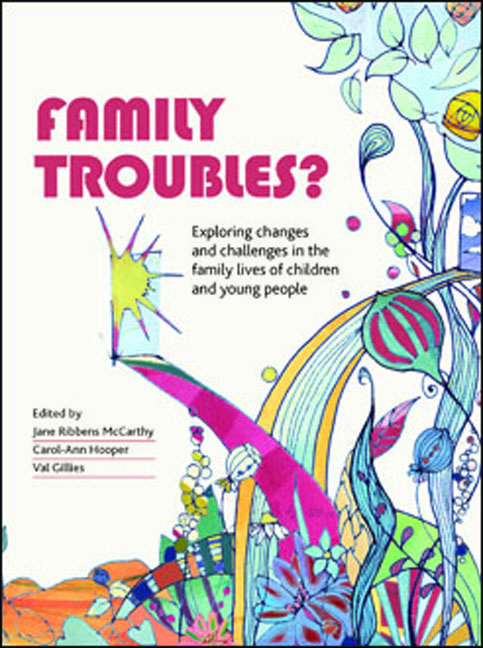Book contents
- Frontmatter
- Contents
- Notes on contributors
- Foreword
- Preface
- 1 Troubling normalities and normal family troubles: diversities, experiences and tensions
- Part One Approaching family troubles ? Contexts and methodologies :Introduction to Part One
- Part Two Whose trouble ? Conteste d definitions and practice: Introduction to Part Two
- Part Three The Normal, The Troubling And The Harmful?: Introduction to Part Three
- Part Four Troubles and transitions across space and culture: Introduction to Part Four
- Part Five Working With Families: Introduction to Part Five
- Index
Part Two - Whose trouble ? Conteste d definitions and practice: Introduction to Part Two
Published online by Cambridge University Press: 07 September 2022
- Frontmatter
- Contents
- Notes on contributors
- Foreword
- Preface
- 1 Troubling normalities and normal family troubles: diversities, experiences and tensions
- Part One Approaching family troubles ? Contexts and methodologies :Introduction to Part One
- Part Two Whose trouble ? Conteste d definitions and practice: Introduction to Part Two
- Part Three The Normal, The Troubling And The Harmful?: Introduction to Part Three
- Part Four Troubles and transitions across space and culture: Introduction to Part Four
- Part Five Working With Families: Introduction to Part Five
- Index
Summary
In this part, themes around difference and conformity are brought into focus, highlighting the personal and public struggles framing the construction of family troubles. All five chapters engage to some extent or another with the politics of definition, revealing how understandings are shaped by prevailing normativities as well as private meanings and relationships. In some instances, this involves family members managing the public problematisation of behaviour that might be experienced as commonplace or more or less ordinary. As many of the chapters in this part illustrate, such dissonance can be a core source of trouble for families, provoking feelings of guilt and anxiety and demanding extensive discursive work to explain and justify perspectives or choices.
For example, Helen Lomax's chapter explores how everyday infant feeding practices are moralised and troubled in professional and policy arenas through the presentation of breastfeeding as ‘natural’ and best for baby in a context where a majority of mothers bottle-feed. In a meticulous analysis of mothers’ discussions with midwives during the early days of motherhood, Lomax draws out the often-defensive rhetorical labour engaged in by mothers in response to the subtle pressures exerted by midwives. This troubling of the ordinary is also addressed in Harriet Clarke and Lindsay O’Dell's chapter on disabled parents and child carers, showing how policy and practice can overlook the everyday concerns of family life for a risk-focused lens. As a consequence, the need to access services can be viewed as a potential threat rather than a support to maintain everyday normality. Similarly, both Geraldine Brady's and Ara Francis's chapters show how the public gaze is instrumental in shaping parents’ interpretations of conduct in children, leading in some cases to a medicalisation of behaviour that might alternatively be viewed in terms of difference and nonconformity. Francis presents a detailed examination of how a group of middle-class parents in the US come to construct their children as having significant problems in relation to their behaviour and or mental health, highlighting the formative role of wider family members, friends, school officials and medical professionals in reinforcing perceived maternal responsibilities to monitor and cultivate development.
- Type
- Chapter
- Information
- Family Troubles?Exploring Changes and Challenges in the Family Lives of Children and Young People, pp. 71 - 74Publisher: Bristol University PressPrint publication year: 2013



